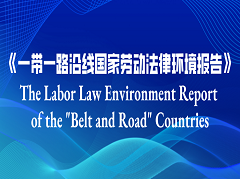本文作者/The Authors:
维克托里诺・马尔克斯
Victorino Márquez
比巴・阿尔西涅加斯
Biba Arciniegas
本文译者/The Translator:
陈静 Chen Jing
一、前言 Foreword
委内瑞拉作为 “一带一路” 倡议中拉丁美洲的重要枢纽,凭借其丰富的石油、天然气、铁矿、铝矾土、黄金、煤炭等资源以及在基础建设领域的发展潜力,正成为中资企业的潜在投资目的地,双方在石油、卫生、水电、公路、铁路和电力基础设施等领域的合作不断深化。委内瑞拉的劳动法基于立法机构颁布的成文法,强调“实质重于形式”原则与“劳工优先保护”立场,其法律框架以强制性的社会福利、严苛的解雇限制及本土化用工要求为核心,形成中资企业在委内瑞拉属地化经营必须重视的合规挑战。
As a key Latin American hub in the "Belt and Road Initiative", Venezuela, leveraging its abundant resources including oil, natural gas, iron ore, bauxite, gold, and coal, as well as its development potential in infrastructure, is becoming a potential investment destination for Chinese enterprises. Cooperation between the two countries continues to deepen in areas such as petroleum, healthcare, hydropower, highways, railways, and power infrastructure. Venezuela's labor law is based on statutes enacted by the legislature, emphasizing the principles of "reality over form" and "preferential protection for employees". Its legal framework centers on mandatory social benefits, strict restrictions on dismissals, and local workforce requirements, posing significant compliance challenges for Chinese companies regarding localized operations in Venezuela.
《委内瑞拉劳动法概览》由拥有多年实务经验的Victorino Márquez律师与Biba Arciniegas律师倾力撰写。他们立足最新修订的劳动法律法规,系统性拆解用工全链条风险点及合规路径,为中资企业突破制度差异壁垒、构建符合委内瑞拉劳工标准的人力资源体系提供实战指引。
The Venezuela Labor Law Overview is elaborately written by Lawyers Victorino Márquez and Biba Arciniegas, with years of practical experience. Based on the latest revised labor laws and regulations, they systematically dissect the risk points and compliance paths throughout the entire employment process, providing practical guidance for Chinese enterprises to break through institutional differences and build a human resources system that conforms to Venezuelan labor standards.
(下文为《委内瑞拉劳动法概览》节选内容之下半部分,完整版详见《一带一路沿线国家劳动法律环境报告》之委内瑞拉篇)
(The following content is excerpted from the Venezuela Labor Law Overview - Part B. For the full version, please refer to the Venezuelan Chapter in the Invitation to Contribute to The Labor Law Environment Report of the "Belt and Road" Countries.)
二、外国公司的雇佣规则 Employment rules for foreign companies
外国公司在通过当地雇员开展业务之前,必须在委内瑞拉设立合法实体。一旦在委内瑞拉设立实体,该公司需承担与当地公司相同的义务。
A foreign company must establish a legal presence in Venezuela before it may carry on business through local employees. Once established in Venezuela, it is subject to the same obligations as a local company.
如果外国公司打算通过中介机构在委内瑞拉雇佣雇员,必须考虑到委内瑞拉劳动法禁止某些旨在逃避或规避劳动义务的外包形式。具体而言,法律禁止涉及临时劳动力供应(“中介”)的安排。如果确定存在非法的外包安排,公司可能会面临罚款,并且被派遣人员可能会提出索赔,要求被认定为该公司的全职雇员,同时公司还需为这些人员提供适用于雇员的劳动福利。
Should a foreign company intend to hire employees in Venezuela through an intermediary, it must consider that the Venezuelan labor law prohibits certain types of outsourcing intended to evade or circumvent labor obligations. Specifically, it prohibits arrangements which involve temporary labor supply ("intermediaries"). If an unlawful outsourcing arrangement is determined, the company could be exposed to fines and claims from the assigned personnel requiring to be enrolled as its full-time employees, as well as the extension of labor benefits applicable to its employees.
如果外国公司确实通过委内瑞拉当地个人代表其提供服务,并将这些人视为独立承包商,那么该外国公司可能会面临错误分类的索赔,以及因在没有合法实体的情况下雇佣工人且未与工人签订雇佣合同而受到与雇佣相关的处罚(如上文所述,只有合法设立的实体才能签订雇佣合同)。
If a foreign company does engage local Venezuelan individuals to perform services on its behalf, effectively as independent contractors, the foreign company may face misclassification claims employment-related penalties for hiring the workers without having a legitimate legal presence and not providing the workers with an employment contract (which only a legally established entity may do, as noted above).
外国公司还可能因未为工人缴纳社会保障体系费用而面临处罚,因未为工人代扣个人所得税而面临处罚,以及因当地雇佣的工人而被认定存在常设机构需缴纳税款和面临处罚,还有其他潜在的处罚。虽然在实践中,委内瑞拉政府或司法机构可能难以对外国实体主张管辖权,但这些潜在的情况或责任可能会影响外国实体未来在委内瑞拉设立合法实体的能力。
The foreign company would also be exposed to penalties for not contributing to the Social Security System for the workers, penalties for not withholding individual income taxes for the workers, and taxes and penalties for the permanent establishment that could have been deemed created by the locally hired workers, and other potential penalties. While in practice it may be difficult for the Venezuelan government or judiciary to assert jurisdiction over the foreign entity, these contingencies or liabilities could affect the foreign entity's future ability to establish a legal presence in Venezuela.
三、外籍员工 Foreign Workers
希望在委内瑞拉工作的外籍员工必须获得劳动签证和工作许可,以在委内瑞拉拥有合法的工作和居住身份。未获得这些许可可能会导致处罚,包括警告、罚款以及可能的驱逐出境。劳动签证的有效期为一年,且可在委内瑞拉境内续签一次。劳动签证要求与委内瑞拉实体签订受当地劳动法管辖的雇佣合同,并获得劳动部的授权。
Foreign employees who wish to work in Venezuela must obtain a labor visa and a work permit to have legitimate work and residential status in Venezuela. Failure to obtain these permits may result in penalties, including warnings, fines, and possible deportation. The labor visa is issued for one year and is renewable once from within Venezuela. The labor visa requires an employment contract with a Venezuelan entity governed by local labor law and an authorization from the Labor Ministry.
委内瑞拉劳动法规定,如果雇主的员工人数超过10人,委内瑞拉分支机构或子公司至少90%的员工必须是委内瑞拉公民(“90%规则”)。此外,外籍员工的薪酬总额不得超过委内瑞拉员工薪酬总额的20%。某些职位,如人力资源经理、船只和飞机船长以及农场经理,必须由委内瑞拉公民担任,并且通常不会批准这些职位的豁免情况。然而,劳动部长在特定情况下可批准该规则的某些豁免。
Venezuelan labor law mandates that at least 90% of the employees of a Venezuelan branch or subsidiary must be Venezuelan nationals if the employer has more than 10 employees (the "90% rule"). Additionally, the aggregate compensation of foreign employees may not exceed 20% of the aggregate compensation of Venezuelan employees. Certain positions, such as Human Resources managers, vessel and aircraft captains, and farm managers, must be filled by Venezuelan nationals, and exemptions for these roles are not typically granted. However, there are certain exemptions to this rule that can be granted by the Minister of Labor under specific circumstances.
寻求豁免 “90%配额” 的公司必须提供详细的理由,解释为何豁免是合理且客观必要的。这可能包括证明没有合格的委内瑞拉公民能够填补公司运营所需的职位。
Companies seeking exemption from the 90% quota must provide detailed justification explaining why the exemption is reasonably and objectively necessary. This may include demonstrating that there are no qualified Venezuelan nationals available to fill the positions required for the operation of the company.
四、雇佣关系的解除/终止 Termination of Employment
(一)解除/终止雇佣的理由 Grounds for Termination
雇主可以基于以下理由“有因”解雇雇员:
不诚实、不道德或具有攻击性的行为。
冒犯或不尊重雇主、雇主代表或其家属。
有意或疏忽的行为,对工作场所的健康和安全造成影响。
对工作场所的健康和安全造成严重影响的失职或轻率行为。
一个月内无故缺勤3天。
(有意或疏忽地)对机器、工具、家具、原材料或成品、半成品造成损坏。
泄露工业或商业机密。
严重违反与劳动相关的义务。
旷工,包括未经许可突然且无正当理由离开工作场所。
拒绝履行属于其工作职责的任务,除非这些任务对雇员的生命或健康构成紧迫且严重的危险。
An employer may terminate an employee "with cause" based on the following grounds:
Dishonest, immoral or aggressive behavior.
Offense or disrespect to the employer, the employer's representatives or family.
Intentional or negligent behavior that may affect health and safety at work.
Omissions or imprudence that seriously affect health and safety at work.
Failure to attend work for 3 days within a month, without cause.
Causing damage (with intent or negligence) to machinery, tools, furniture, raw materials or finished or unfinished products.
Disclosure of industrial or trade secrets.
Serious breach of labor-related obligations.
Abandonment of work, including the sudden and unjustified exit from the workplace without permission.
Refusal to perform duties that are part of the employee's job description, unless the duties represent an imminent and grave danger to the life or health of the employee.
(二)工作稳定性 Job Stability
除高层管理人员外,所有雇员都享有工作稳定性,这意味着雇主不能无正当理由解雇他们。
All employees, except for top-level and management, are entitled to job stability, which means they cannot be dismissed without cause.
如果雇主打算“有因”解雇雇员,必须在解雇之日起5个工作日内通知主管劳动法院,并说明解雇理由。如果雇主未通知法院,解雇将被视为“无因”解雇。
If an employer intends to terminate an employee "for cause", it must notify the competent labor courts and indicate the grounds for dismissal with 5 working days from termination. If the employer fails to notify the courts, the dismissal will be considered "without cause".
雇员可以向法院对解雇提出质疑,但如果在雇佣关系解除/终止之日起10天内未提出反对,将失去复职的权利。
Employees may challenge the dismissal with the courts but lose the right to re-instatement if they do not oppose the dismissal within 10 days of the termination of employment.
此外,以下雇员享有特殊的解雇保护,这意味着只有在有正当理由且获得劳动监察部门事先授权的情况下才能解雇他们:
孕妇,从怀孕开始至分娩后2年内。
父亲,从妻子怀孕开始至孩子出生后2年内。
收养3岁以下儿童的父母,从收养之日起2年内。
残疾或患病儿童的父母。
劳动关系中止期间的雇员。
通过非法外包安排的雇员。
工会代表。
健康与安全代表。
In addition, the following employees are afforded special protection against dismissal, meaning they can only be dismissed with cause and prior authorization from the Labor Inspectorate:
Pregnant women, from the beginning of the pregnancy, up to 2 years after birth.
Fathers, from the beginning of the pregnancy of the wifes, for up to 2 years after birth.
Parents adopting children under the age of 3, for up to 2 years from the adoption.
Parents of a disabled or sick child.
Employees during suspension of the labor relationship.
Employees outsourced through unlawful outsourcing arrangements.
Trade union representatives.
Health and Safety representatives.
(三)雇佣保护(解雇限制) Employment Protection (Bar Against Dismissal)
目前,委内瑞拉实行一般性的解雇限制或劳动冻结措施,这防止雇主在无正当理由且未获得劳动部事先授权的情况下解雇签订无固定期限合同的雇员。劳动冻结措施适用于除高层管理职位和季节性或临时雇员之外的所有雇员。
There is currently a general bar against dismissal or labor freezes in Venezuela which prevents employers from terminating employees on indefinite-term contracts without cause and without obtaining prior authorization from the Labor Ministry. The labor freeze applies to all employees except those holding top-level management positions and seasonal or temporary employees.
只有在出现严重的不当行为或不服从管理的极端情况下,劳动部才会批准解雇。因此,雇主通常会寻求与雇员达成相互协议来解除/终止劳动关系。
Only in the most extreme cases of misconduct or insubordination does the Labor Ministry grant authorization for dismissal. Therefore, employers tend to seek mutual agreement with employees to terminate the labor relationship.
如果在3个月内进行解雇,符合以下数量标准的即为大规模裁员:
Mass layoffs occur when dismissals take place within a 3-month period, in the following numbers:
At least 10 percent of employees in companies with more than 100 employees.
20 percent of employees of companies with more than 50 employees.
10 employees in companies with less than 50 employees.
当发生大规模裁员时,劳动部有权暂停集体裁员,以确保就业。大规模裁员的要求不适用于因员工接受优厚的解除/终止雇佣条件而自愿离职所导致的裁员。这些要求仅适用于雇主单方面实施的裁员。
When a mass layoff takes place, the Labor Ministry has the authority to suspend collective redundancies to ensure employment. Mass layoffs requirements do not apply to job reductions that are the result of voluntary departures of employees following enhanced termination offers. The requirements only apply to job reductions that are implemented unilaterally by employers.
雇主必须向劳动部启动解除/终止员工雇佣关系的行政程序。申请必须阐明解除/终止雇佣关系的经济或技术理由,并提供某些证明文件。提交申请后,将成立一个谈判委员会。谈判委员会由工会指定的1名代表、雇主指定的1名代表以及担任委员会主席并充当调解人的劳动监察员组成。谈判委员会可以就被解雇员工的数量、解雇的时间范围以及向离职员工提供的解雇补偿达成协议。谈判委员会也可以商定避免裁员的替代措施,以取代解除/终止雇佣关系。
Employers must initiate an administrative procedure for the termination of the workforce before the Labor Ministry. The petition must set forth the economic or technical reasons that underpin the termination of the workforce and provide certain supporting documentation. Once the petition is filed, a negotiation committee is set up. The negotiation committee is composed of 1 representative appointed by the workers'union, 1 representative appointed by the employer and the labor inspector who chairs the committee and acts as a mediator. The negotiation committee may seek an agreement on the number of workers to be terminated, the timeframe for such terminations and the termination payments that will be provided to departing workers. Instead of the workforce termination, the negotiation committee may agree on alternative measures that avoid job cuts.
在委内瑞拉,这一程序很少被使用,大多数的雇佣关系解除/终止是通过谈判达成的,且无需政府介入。
This procedure is rarely used in Venezuela and most terminations are the result of a negotiation process with no government involvement.
(四)协商解除 Termination Agreements
鉴于委内瑞拉严格的劳动保护和劳动冻结措施,解雇雇员可能是一个复杂且具有挑战性的过程。然而,存在一些切实可行的方法来推进这一过程,同时确保遵守《劳动法》并尽量减少潜在的法律纠纷。
Given the stringent labor protections and the labor freeze in Venezuela, terminating an employee can be a complex and challenging process. However, there are practical ways to navigate this process while ensuring compliance with the Labor Law and minimizing potential legal disputes.
1. 自愿离职 Voluntary Resignation
鼓励雇员自愿辞职是一种可行的方法。这需要营造一种环境,让雇员可以自行选择辞职。雇主可以提供以下激励措施:
Encouraging voluntary resignation can be a practical approach. This involves creating an environment where the employee may choose to resign on their own accord. Employers can offer incentives such as:
Severance Packages: Offering a generous severance package that exceeds the legal requirements can motivate the employee to resign voluntarily.
Career Counseling: Providing career counseling or job placement assistance can help the employee transition to a new job, making resignation more appealing.
2. 双方达成协议 Mutual Agreement
通过双方达成协议来解除/终止雇佣关系是另一种可行的方法。这需要就双方都能接受的条款进行谈判。关键考虑因素包括:
Reaching a mutual agreement for termination is another practical approach. This involves negotiating terms that are acceptable to both the employer and the employee. Key considerations include:
Written Agreement: Ensure that the mutual agreement is documented in writing and signed by both parties.
Fair Compensation: Offer fair compensation, including severance pay, accrued benefits, and any additional incentives to encourage the employee to agree to the termination.
3. 有因解雇 Dismissal with Cause
如果雇员存在不当行为或未能履行职责,有因解雇可能是合理的。选择这种方式:
-
Hiring & Recruitment
Not only individuals care about employment, so does the countr...
-
Employment Documents & Policies
Puran is experienced in providing tailor-made documents and polic...
-
Trade Union & Collective Bargaining
In response to the request from the government and trade unions...
-
Non-Compete & ESOP
It is inevitable for companies to get talents from its competitor...
-
Labor Standards
Even when laws and regulations regarding wages, working hours...
-
Work-related Injury & Occupational Diseases
When emergent cases like work-related injury or occupational...
-
Production Safety
The legal representative of an employer is the chief person respo...
-
CSR & ESG Report
It is almost a norm for mature companies to publish CSR report...
-
Social Insurance & Benefits
The social insurance covered pension, medical, work-related injur...
-
Layoff & Arrangement
The arrangement of employee placement and assessment of relevant...
-
Labor Arbitration, Litigation & Inspection
In labor inspection, employers are obliged to fully cooperate...
-
Employment Management & Design
Traditional employment relations stress the significance of long...
-
Employment Compliance Review & Investigation
The emerging concept of "non-prosecution due to compliance...
-
Cross-Border Employment & Talents Immigration
A comprehensive and complex supervisory legal system has been...
-
Flexible Staffing & Outsourcing
The sweeping development of platform economy and gig economy...
-
Personal Information & Privacy Protection
Throughout the whole process of employment, it is hardly possible...
-
Anti-Sexual Harassment & Anti-Employment Discrimination
Diversity, equity, and inclusion (DEI) are the vital elements...
-
International Trade and Supply Chain
In the process of globalization, a growing number of enterprises...
-
Training
Apart from labor legal services based on clients' requests...





